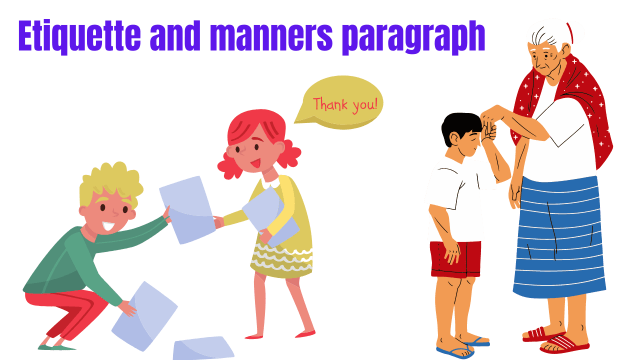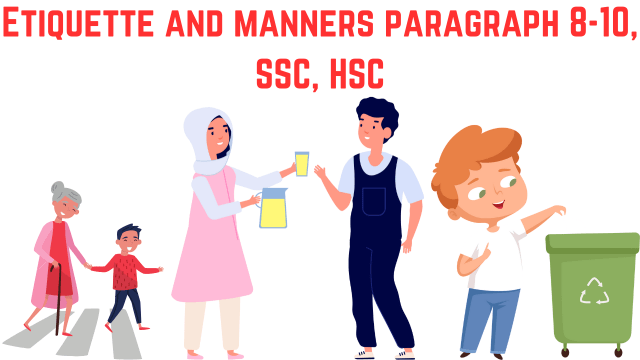Etiquette and manners paragraph 8-10, SSC, HSC and all students 100-500 words. Go through the below written paragraph carefully, hope you will be able to appear in any exam by reading it.
Etiquette and manners paragraph 120 keyword
Etiquette and manners are essential social norms that guide how individuals interact with others in various situations. They encompass a set of polite behaviours and gestures that promote respect, consideration, and courtesy towards others. Good etiquette and manners allow people to navigate social interactions gracefully, fostering positive relationships and a harmonious society. These principles often include saying “please” and “thank you,” punctual, respecting personal space, and using appropriate language. Embracing etiquette and manners enhances communication and leaves a lasting positive impression on others, making it an indispensable aspect of daily life.
Etiquette and manners paragraph 200 keyword
Etiquette and manners are the time-honoured art of navigating social interactions gracefully and courteously. These essential social norms serve as guidelines for how individuals behave in various situations, showing respect and consideration towards others. Good etiquette and manners are crucial for fostering positive relationships and creating a harmonious society. Simple gestures like saying “please” and “thank you” showcase politeness and gratitude, while being punctual demonstrates respect for others’ time. Respecting personal space and using appropriate language contribute to smooth and respectful communication. Embracing etiquette and manners is not just about following rigid rules; it’s about showing kindness and consideration in our daily interactions. When we practice good manners, we make others feel valued and appreciated, enhancing the quality of our relationships. Moreover, proper etiquette plays a vital role in professional settings, leaving a lasting positive impression on colleagues, clients, and superiors. It reflects one’s professionalism, reliability, and respect for others.In conclusion, etiquette and manners are the cornerstone of polite social interactions. Adhering to these principles creates a more empathetic and understanding world where kindness and respect prevail.
Etiquette and manners paragraph 300 keyword
Etiquette and manners are timeless principles that govern how individuals interact with others, promoting courteous and respectful behaviour. These social norms provide a framework for navigating various situations with grace, kindness, and consideration towards others. Good etiquette and manners are essential for fostering positive relationships and creating a harmonious society. Simple gestures like saying “please” and “thank you” showcase politeness and gratitude, while holding doors open for others reflects thoughtfulness. Being punctual demonstrates respect for others’ time and commitment to valuing their presence. Respecting personal space and using appropriate language is vital to practising good manners. Listening actively and allowing others to speak without interruption is a mark of respect and empathy. Etiquette and manners extend beyond social settings; they also play a significant role in professional environments. Respecting colleagues, clients, and superiors in the workplace fosters a positive and productive atmosphere. Business etiquette, such as proper handshakes and professional communication, reflects professionalism and reliability. Moreover, etiquette helps navigate cultural differences, showing sensitivity and understanding in diverse settings. Being aware of and respecting cultural norms promotes inclusive and harmonious interactions. In conclusion, etiquette and manners are the keys to harmonious social relationships. Embracing these principles enhances communication, leaves a lasting positive impression on others, and contributes to a more compassionate and considerate society.
See More:
FAQs (Frequently Asked Questions)
What is etiquette?
Etiquette refers to social norms and rules governing polite behaviour and interactions in various situations.
Why are manners important?
Manners are essential because they promote courteous and respectful behaviour, fostering positive relationships and creating a harmonious society.
What are some examples of good manners?
Examples of good manners include saying “please” and “thank you,” holding doors open for others, being punctual, respecting personal space, and using appropriate language.
How do good manners impact professional settings?
Good manners reflect professionalism and reliability in professional settings, contributing to a positive and productive work environment.
Why is it important to be aware of cultural differences in etiquette?
Awareness of cultural differences in etiquette shows sensitivity and understanding in diverse settings, promoting inclusive and harmonious interactions.

How can practising good etiquette enhance communication?
Practising good etiquette, such as active listening and giving others a chance to speak without interruption, enhances communication and shows respect and empathy.
What role does etiquette play in social relationships?
Etiquette plays a crucial role in social relationships by creating a foundation of respect and consideration and fostering positive and meaningful connections with others.
How can embracing etiquette and manners contribute to a compassionate society?
Embracing etiquette and manners leads to a more compassionate society where kindness and respect prevail, promoting empathy and understanding among individuals.
Related search’s:
etiquette and manners paragraph hsc
Etiquette and manners paragraph for class 8
Etiquette and manners paragraph for class 7
Etiquette and manners paragraph for class 6
Etiquette and manners paragraph 250 words
Etiquette and manners paragraph 150 words
etiquette and manners paragraph 200 words
Etiquette and manners paragraph 100 words pdf download
Etiquette and manners paragraph 100 words pdf
GPS location tracker: See NOW

